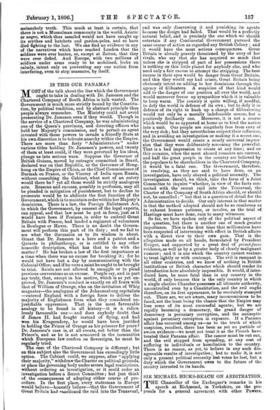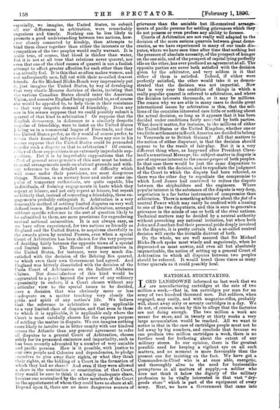SIR MICHAEL HICKS-BEACH ON ARBITRATION.
THE Chancellor of the Exchequer's remarks in his speech at Richmond, in Yorkshire, on the pro- posals for a general agreement with other Powers. especially, we imagine the United States, to submit all our differences tc, arbitration; were remarkably sagacious and timely. Nothing can be less likely to promote a good understanding between two nations, how- ( e'er closely connected by kinship, than attempts to bind them closer together than either the interests or the sympathies of the two peoples would really warrant. It is quite true, of course, that blood is thicker than water, but it is not at all true that relations never quarrel, nor even that one of the chief causes of quarrel is not a foolish attempt to affect greater affection for each other than they can actually feel. It is this that so often makes women, and not unfrequently men, fall out with their so-called dearest friends. As Sir Michael Hicks-Beach very impressively put it, just imagine the United States, by way of developing t hat very elastic Monroe doctrine of theirs, insisting that he various Canadian States should enter the American Union, and conceive England being appealed to, as of course she would be appealed to, to help them in their resistance to that very despotic demand of friendship. Does any one in his senses suppose that we could possibly submit a quarrel of that kind to arbitration ? Or suppose that the English democracy, in deference to a similarly despotic impulse of friendship, were to insist on the United States jeioing us in a commercial league of Free-trade, and that he United States prefer, as tiny would of course prefer, to retain their financial independence. Does any one in his si-r.ses suppose that the United States could be persuaded to refer such a dispute as that to arbitration ? Of course, eit her of these suppositions is an extremely improbable sup- eesition. But it is by improbable suppositions that the ffect of general arrangements of this sort must be tested. eneral arrangements made on abstract grounds and with- out reference to the detailed cases of difficulty which will come under their provisions, are most dangerous things. Nations, in an unwary hour and under some im- pulse of temporary enthusiasm, are quite capable, like individuals, of forming engagements in haste which they repent at leisure, and not only repent at leisure, but repent so bitterly that, instead of cementing a friendship, these en- gagements probably extinguish it. Arbitration is a very reasonable method of settling limited disputes on very well defined issues. But general Courts of Arbitration, arranged without specific reference to the sort of question likely to be submitted to them, are mere provisions for engendering mutual national animosities. It is not always easy, as we have often experienced, for two nations as friendly as England and the United States, to acquiesce cheerfully in the awards given by neutral Powers, even when a special Court of Arbitration has been chosen for the very purpose of deciding fairly between the opposite views of a special and limited issue. The House of Representatives in the United States, for instance, were very much dis- satisfied with the decision of the Behring Sea quarrel, to which even their own Government had agreed. And England was bitterly dissatisfied with the decision of the Para Court of Arbitration on the Indirect Alabama Claims. But dissatisfaction of this kind would be aggravated to a point beyond the power of any ordinary equanimity to endure, if a Court chosen without any ',articular view to the special issues to be decided, gave a decision that was obviously more or less eadequete on a matter touching very closely the pride and spirit of any nation's life. We believe that, the reference to arbitration is only applicable to a very limited class of disputes, and that even to those to which it is applicable, it is applicable only where the Court is most carefully chosen for the express purpose of settling the matter in dispute. We can imagine nothing more likely to involve us in bitter enmity with our kindred across the Atlantic than any general agreement to refer all disputes to a general Court of Arbitration, chosen solely for its presumed eminence and impartiality, such as has been recently advocated by a number of very amiable and pacific persons. How is it possible, with justice to our own people and Colonies and dependencies, to-pledge ourselves to give away their rights, or what they think their rights, at the bidding of a Court in the formation of which they had no share ? And even if they were allowed a share in the nomination or constitution of that Court, they would be sure to think it a totally inadequate share, because one neutralised by the other members of the Court in the appointment of whom they could have no share at all. Depend upon itethere are no more dangerous sources of grievance than the amiable but ill-conceived- arrange.. ments of pacific persons for settling grievances which they do not possess or even profess any ability to foresee. Courts of Arbitration are not really well adapted to the decision of the more serious quarrels between great demo- cracies, as we have experienced in many of our trade ells- , putes, where we have seen time after time that nothing but the pressure of absolute necessity, of the prospect of hunger on the one side, and of the prospect of capital lying perfectly idle on the other, has ever produced an agreement at all. The opposite parties are never both satisfied with the decision given by the arbitrator, and very seldom is it that either of them is satisfied. Indeed, if either were perfectly satisfied, the other would take it as demon- strated that the decision was not impartial, Now that is very near the condition of things in which- a really popular quarrel is referred to arbitration, and where - the decision interests thousands, or it may be millions. The reason why we are able in many cases to decide great international issues by arbitration is this, that the mil- lions of the countries interested care little or nothing about the actual decision, so long as it appears that it has been decided under conditions fairly accepted by both parties. What does it matter, for instance, to the millions of either the United States or the United Kingdom, whether one or twolittle settlements in South America are decided to belong to Venezuela or to British Guiana? All that matters to the nation of either disputant, is that the decision should appear to be the result of fair-play. But it is a very different thing when, as happened after President Cleve- land's sensational Message, the subject-matter in dispute is one of supreme interest to the amour-propre of both peoples. In that case there would be just the same disposition to find fault with the decision, and to repudiate the judgment of the Court to which the dispute had been referred, as there was the other day to repudiate the compromise to which Lord James had contrived to reduce the dispute between the shipbuilders and the engineers. Where popular interest in the substance of the dispute is very deep, negotiation is a far better instrument of compromise than arbitration. There is something arbitrary about the fiat of a neutral Power which may easily be credited with a leaning to one of the two disputants, and this is sure to generate a grievance in the minds of one or both of the rival nations. Technical matters may be decided by a neutral authority without provoking any national irritation, but when both John and Jonathan feel their personal pride deeply involved in the dispute, it is pretty certain that a so-called neutral decision will excite the irritable distrust of both.
On the whole, we are well assured that Sir Michael Hicks-Wach spoke most wisely and sagaciously, when he deprecated as most unwise, and even all but absolutely impracticable, the notion of setting up a general Court of Arbitration to which all disputes between two peoples should be referred. It would breed three times as many bitter quarrels as it could possibly heal.







































 Previous page
Previous page